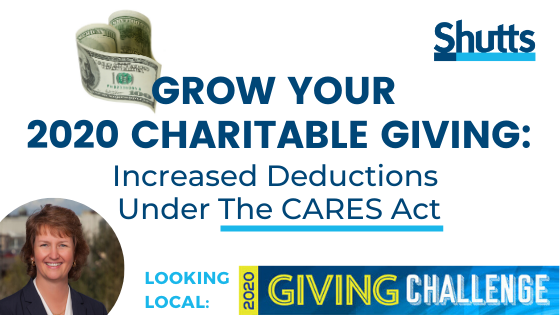 Commentary by: Charla Burchett, Esq.
Commentary by: Charla Burchett, Esq.
The Coronavirus Aid, Relief, and Economic Security Act (“CARES Act” or “Act”) provides emergency assistance and health care response for individuals, families, and businesses affected by COVID-19. The CARES Act also includes permanent and temporary provisions affecting individual donors for the 2020 tax year.
In an effort to incentivize more charitable giving during these difficult times, the CARES Act enhances certain charitable contribution deductions:
- Deductions for Non-Itemizers
- Taxpayers who do not itemize their deductions can take a one-time cash deduction of up to $300 for gifts made to qualified charitable organizations during calendar year 2020.
- Suspension on Adjusted Gross Income Limitation
- Generally, individuals can only take a charitable deduction of up to 60% of their adjusted gross income (AGI), regardless of the total amount of charitable gifts made by that individual. However, in the 2020 tax year, individuals can deduct all of the cash contributions made by the individual to one or more qualified charitable organizations, as long as they do not exceed 100% of their AGI.
Non-Itemizers Can Make a BIG Impact with a SMALL Contribution
The enhanced charitable deductions made available to individuals under the CARES Act provide an incentive to individuals to make charitable contributions in 2020. The CARES Act provision benefits those individuals who otherwise would not receive a tax deduction for cash gifts made in 2020. Local non-profit organizations often rely on a larger number of smaller contributions; these are the organizations that are most likely to benefit from the charitable deduction afforded to non-itemizers.
Looking Local: A Manasota Platform for Charitable Giving
Take for example “The Giving Challenge,” hosted by the Community Foundation of Sarasota County, which assists over 700 local charities in receiving a large number of small contributions during its 24-hour donation event. Reports show that during the 2018 Giving Challenge, local non-profits in Sarasota, Manatee and DeSoto counties received contributions as small as $25 with the average gift being $82. However, almost 75,000 total gifts were made in 2018 resulting in over $6 million being gifted to local charities for their unrestricted use.
The upcoming “2020 Giving Challenge” will connect over 700 nonprofit organizations with passionate donors on April 28, 2020. This year, the Patterson Foundation will match each contribution by an individual donor up to $100 per organization.
Due to COVID-19, the challenge has pivoted to an exclusive online fundraising platform. While some may not be able to give in 2020 (and others may only be able to give less), it is critical for contributors to understand that their charitable gifts are not inconsequential and make a tremendous impact to a local effort like the “2020 Giving Challenge,” especially considering the magnitude of needs in the community at this time. Many non-profits may be struggling to keep their doors open or to buy computers to support remote work, but as a recipient of an individual donor’s contribution plus the matched donation from the Patterson Foundation, such a non-profit would benefit immensely from the enhanced charitable contributions provision under the CARES Act. Furthermore, if an individual were to take advantage of the entire $300 tax deduction by making a donation of $100 to three different organizations during the “2020 Giving Challenge,” not only would the individual donor receive a deduction on their tax return of $300, but the gift to the donor’s favorite three charitable organizations would be doubled and each of those organizations would receive $200. Alternatively, those able to give more could maximize their gift in 2020 because their contribution would not be limited to only 60% of their AGI, allowing donors to give any amount up to 100% of their AGI.
As the current health and financial crisis unfolds, individuals should be aware of how the CARES Act is making charitable giving even more rewarding – for both donors and non-profit recipients.
